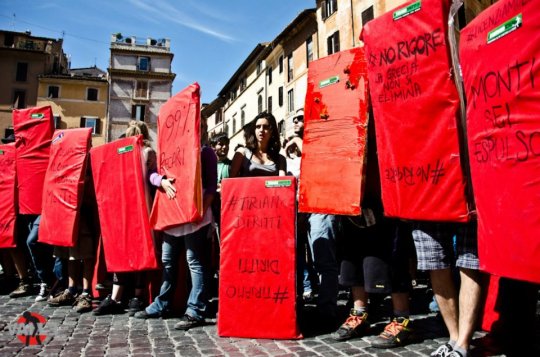Tagged: alternative universities
Freedom From Education: Decolonial Study for Abolishing the Prison-University Complex
Against the romanticizing of education, Leftists should recognize alternative regimes of study, as practiced in prison organizing and indigenous peoples’ movements, and participate with them toward dismantling the intertwined regimes of education and carcerality.
– an essay by Abraham Bolish –
Left movements in North America romanticize education in many ways. Calls to “defend public education” emanate from the most radical movements of students, like the ‘Maple Spring’ in Quebec, and teachers, like the social justice-oriented Chicago Teachers Union. In struggles against prisons, with images of the ‘school-to-prison pipeline’ and calls for ‘education not incarceration,’ we on the Left often criticize contemporary education as corrupted for disproportionately funneling poor youth of color into the penal regime. Conversely, in organizing around universities, the university has been framed as losing its educational mission and becoming like a prison, an “ivory cage,” which “incarcerates” potentially resistant young people behind walls of debt.
This fetishizing of education is a key obstacle to Left movements’ revolutionary goals. Seeing ‘revolution’ as an overturning of a dominant order, a revolutionary movement would need to radically transform all of the regimes composing that order—from the family and work to transportation and prisons. Such a movement is hindered if any one of these regimes is immunized from critique. That is precisely what has happened with the regime of education.
Unsettling the University: For Abolitionist, Decolonial Education Struggles
– An Interview with Matthew Evsky (Part 2) –
Summary:
In this interview, Matthew Evsky* speaks on ways that the education system is bound up with policing, mass incarceration, and settler colonialism. How can we integrate education struggles with abolitionist, decolonial approaches? For resistant alternatives, we can look to Liberation Schools and free, cooperative universities embedded in communities. Facing major barriers to these from racism, we must call on white people to renege on their racist bargain with the state and capital. How can we popularize such an abolitionist politics with narratives that convince people to be for annihilating the very system that gives them privileges?
Contaminating the University, Creating Autonomous Knowledge: Occupied Social and Cultural Centers in Italy
An Interview with Claudia Bernardi
Summary:
From her experiences creating an occupied social center in Rome, Claudia Bernardi speaks of self-organization and self-education between migrants, students, artists, and other precarious workers. Within the global crisis, these spaces of resistance make common institutions that cross the boundaries of the university and city. As a kind of autonomous study center, the project has intertwined labor union organizing with political movements and knowledge production. Building occupations have spread to include artists and other cultural workers who have squatted cinemas and theaters, making culture as a common good. In a time of proliferating borders and frontiers, we all become migrants, struggling across divisions for shared spaces, culture, and knowledge.
Bloated Corpses and Institutional Limits – An Interview with Mark Paschal
Summary:
Drawing on his extensive research on the history of universities, Mark Paschal debunks mystified views of higher education. Instead of relying on overly sophisticated theories that are tough to popularize, Mark recommends focusing on what attracts people to universities: opportunities to make better lives for themselves. We can create autonomous universities with a kind of vocational training more in line with historical materialism than the humanities—to learn skills for taking over empty buildings and holding down city blocks for radical causes. To connect such organizing with the informal networks that already exist in marginalized communities, rather than presuming that the knowledge and skills gained in universities can be useful in struggles, learn others’ modes of communicating and ask questions about how we can be useful. Since the fucked-up-ness of the capitalist university-prison-industrial complex can seem overwhelming, rather than merely trying to illuminate the problems, we need physical interventions that demonstrate viable alternatives. To inspire a mass exodus from universities, we must continue to struggle within existing institutions—such as through strikes and occupations—while we create autonomous universities that force the dominant ones to confront their own limits.



